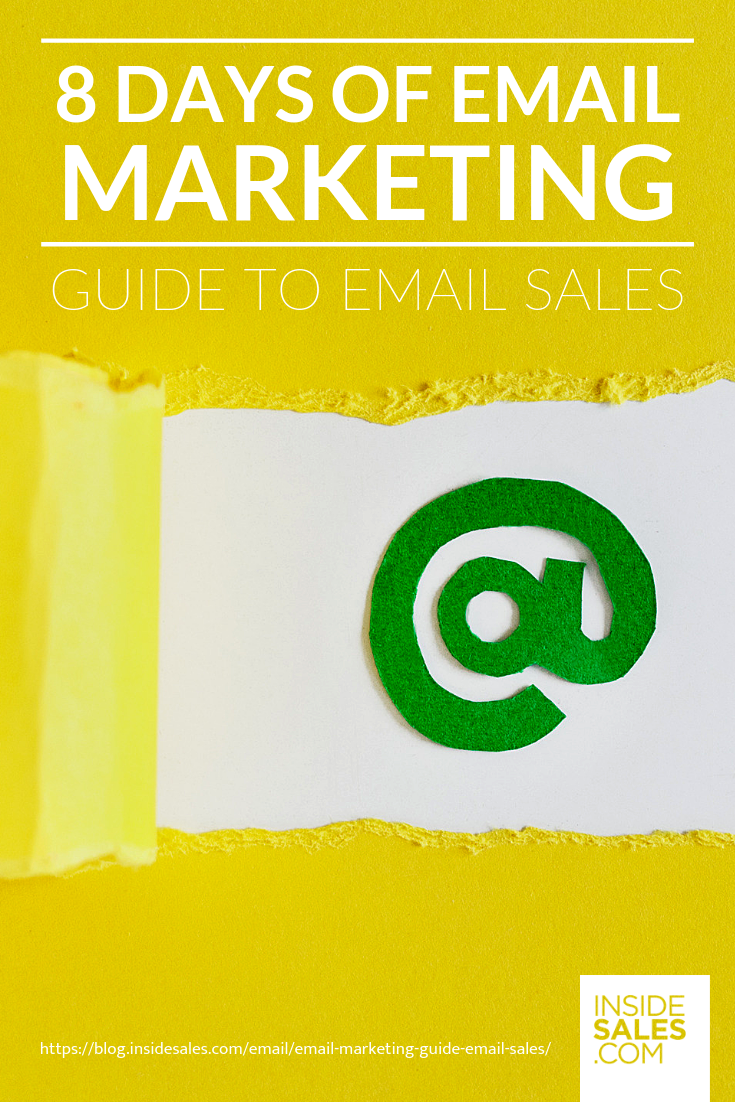8 Days Of Email Marketing | Guide To Email Sales
Learn how you can enjoy the benefits of an effective email marketing strategy with Breakthrough Email’s Bryan Kreuzberger.
RELATED: 3 Salesforce Email Template Tips for Effective Sales Emails
In this article:
- About Our Guest — Bryan Kreuzberger of Breakthrough Email
- Sales Email Secrets: An XANT Study
- The Outbound Triangle
- The Waterfall Technique
- Marketing Through Email: How to Create Your Message
- Common Mistakes Made in Email Marketing
- The Importance of Getting Email Marketing Right
- The Playbook
Email Marketing for Business: How to Do It Right
About Our Guest — Bryan Kreuzberger of Breakthrough Email
Recently, we had a chance to speak with the founder and CEO of Breakthrough Email, Bryan Kreuzberger. His company helps businesses and sellers find leads and grow their revenue.
He’s one of the Top 40 Sales Experts of Forbes and he’s featured in The New York Times.
As a salesperson, Kreuzberger tried different ways to reach his clients and get them to respond. At that time, he was selling a very specific product and he had hard-to-reach buyers.
He’s experienced in sales strategies like cold calling, networking, and trade shows. Yet, it wasn’t until he learned how to write emails that he was able to get people to meet with him.
This was when his sales career really took off. In our conversation with him, Kreuzberger shared with us how to write effective emails and gave us tips on creating personalized email templates.
The Benefits of Email Marketing
With other forms of communication available to businesses today, what’s so special with email marketing? Here are top three reasons why you should prioritize marketing through email:
- You own your email list — In social media, the host website owns your account and fans, and they have the authority to suspend your access anytime. In email marketing, you own the contacts you earned and the email lists you built.
- Email is the best means of communication — A study conducted by Radicati Group revealed that even before 2019 began, more than 3.8 billion people are email users.
- Email marketing converts better — Campaign Monitor reported that email marketing yielded an ROI of $44 for every dollar spent. It also generated 174% more conversions compared to social media.
Sales Email Secrets: An XANT Study
Before we get to the nitty-gritty of email marketing, let us share with you a recent study that XANT conducted.
We’re constantly finding ways on how to make people be better at what they do. To do this, we look at every aspect of the sales process. We also focus on revenue growth.
Since sending emails is part of the sales process, we looked at 18 million emails and tried to understand what some of the best practices were.
One component of the study is the time of day when people actually open their emails. We also looked at download rates — when do people actually download the content you send them?
Imagine being able to map all your communication to the likelihood of people to actually consume what you send them. It’s basically being able to figure out the best time to send email to your targets.
In this study, we discovered that optimal send time produces 21% better open rates and 64% better download rates.
The Outbound Triangle

Now, there are two parts to every sale — the opening and the closing. We’re going to focus our discussion on opening the sale — getting the lead and making sure you get to meet with the actual decision-maker.
Kreuzberger began honing his skills in email marketing by writing and sending emails, always testing to see what worked.
He framed the outbound like a triangle. At the top of the triangle is who you contact — that’s the target list, the decision-maker, and the research you do to find the information you need.
The bottom left is how you reach them. You can do this through cadence tools like InsideSales, an outside agency, an inbound lead, a trade show, cold call, or referral.
At the bottom right is what you say. In the case of email, it’s the message. People call it the “pitch,” which is how you establish credibility.
Kreuzberger found that for most people, what you say is the most important factor. Yet he believes it’s actually who you contact.
It’s because who you contact brings you the client. You need to find somebody who is “BANT-qualified” — someone who has the budget, authority, need, and timing.
You can have the greatest message in the world, but it won’t matter if you reach out to the wrong persons.
That’s why the first thing you should do is to identify who to contact, then figure out the right thing to say to get responses.
Ultimately, what we want are customers, not responses. The big advantage of outbound is you get to pick your customers.
In his discussion, Kreuzberger focused more on the actual messaging, but it is good to keep in mind that who you target is absolutely critical.
The Waterfall Technique
One of the first things that Kreuzberger learned from a targeting perspective is the practice of delegation. If his target was the Director of Marketing, he would get delegated down to an outside agency.
For any outbound, there’s a whole hierarchy involved. Because they practice delegation, Kreuzberger decided to reach out to the VP of Marketing, the Chief Marketing Officer, and the Chief Executive Officer instead.
His solution was to send emails to all three people whose positions are above his actual target person’s. Though he had no business contacting them, eventually, the delegation practice would earn him a meeting with a decision-making person with authority.
He is then able to get buy-in and use that leverage.
Marketing Through Email: How to Create Your Message
To help us understand email marketing further, Kreuzberger shared with us a sample email to McDonald’s.
In his subject line, he used “Appropriate Person,” as a global company like McDonald’s would have a lot of people involved in marketing and media buying. The purpose of this email is to find the right contact person — the decision-maker.
The first sentence doubles as the preview pane, which is what his recipient can see before opening his email. The second section is the opportunity, which introduces what his business can do for McDonald’s. Then the closing part is his request.
RELATED: C-Level Secrets — Tips for Connecting with the Top Brass
Step 1: Your Purpose

The first step in creating your email marketing message is introducing your purpose for writing. The subject line is the Appropriate Person. Kreuzberger gave us this example:
“I am writing in hopes of finding the appropriate person who handles multicultural media?
I also wrote to Person A, Person B, and Person C in that pursuit. If it makes sense to talk, let me know how your calendar looks.”
The other persons he was referring to were the CEO, CMO, and VP of Marketing. He doesn’t practice copying people in a single email — he writes four separate emails to triple his response rate.
When asking for the contact person, Kreuzberger advises salespeople to be broad. This is because you want your recipient to continue reading your email.
He also mentioned that the common mistake of most salespeople in writing emails is talking about themselves. For instance, starting the email with something like, “My name is Bryan Kreuzberger and I’m the Founder of Breakthrough Email…”
Your recipient can already see from their inbox who they’re getting the email from. What’s left to do is get to the point. The subject line is the point, and the first sentence reinforces that.
While there is really nothing wrong about starting your email with a let-me-tell-you-about-us spiel, your aim is to influence your recipient. To do that, you have to hook them in with what they actually care about.
Step 2: The Opportunity
Instead of talking about what you can do, talk about what you can do for your potential customers.
In the first sentence of your email’s body, frame the major concept. What is the end result they can expect or would want from you?
For example, the company Bryan referred to in his sample email targets restaurant owners. So he framed the opportunity he offers this way:
“Voodoo Box helps restaurants increase sales and revenue.”
People will remember the first and last things you say. That’s why in your email, make sure you’re referencing the main benefit for them or the frustration that you’re solving.
Kreuzberger said that if he were to distill his email copy into two words, it would be “credible opportunity.” The question is, how will you establish credibility if your prospect doesn’t know you or your company?
The answer is to reference your most recognizable clients. For example:
“Some of our clients include Burger King, P&G, and Chili’s.”
Now, if you have a unique business and model, and very hard-to-reach decision-makers, Kreuzberger warns that you need to understand the fundamentals of creating email copy first. You can’t simply take any template and expect top decision-makers to meet with you.
Step 3: Your Ask
The third step is your ask, or your request. For example:
“If you are the appropriate person to speak with, what does your calendar look like? If not, whom do you recommend I talk to?
Thanks,
Full Signature”
In the signature, Kreuzberger found that it’s not necessary to include a web page link. The reason behind this is he doesn’t want his recipient to visit his page but not respond to him.
The goal is to have your recipient delegate your request to somebody else, or get them to agree to meet with you.
Kreuzberger also shared their findings from testing word choices. They discovered that using “calendar” instead of “schedule” brings a 35% increase in response. The tip is to not be too desperate.
Likewise, using the word “talk” instead of “meet” or “call” brings a 60% increase in response. He advised to not worry over how you’re going to meet with your prospect.
What you want is to ask them to give the lowest-perceived commitment on their part. The order of priority you should have is:
- Finding customers
- Contacting decision-makers
- Creating the messaging
- Getting the meeting
If you don’t get to the decision-maker, you’re empowering somebody to say ‘no’ to you, even if they don’t have the ability to say ‘yes.’
Other Effective Email Marketing Tips
Aside from knowing who to contact and how to write your message, here are helpful tips you can apply:
Choose Quality over Quantity
Providing content with value is more important than the number of emails you send out.
Make sure you have a good purpose for sending out an email or launching a marketing campaign. You won’t be able to maximize the effectiveness of email marketing if you don’t have goals.
At the same time, don’t overwhelm your subscribers by bombarding them with messages. Plan out your content well to increase your engagement rate.
Personalization and Visuals
Knowing who you’re reaching out to helps a great deal with personalization. Take the time to research about your prospect or customer so you can create a compelling and persuasive message.
Keep your paragraphs short and use bullet points so your recipients can skim through your content easily.
Use visuals as part of your message, but don’t overdo it. One way to do this is to integrate a part of your message within graphics to entice your recipient to read through your email.
Keep in mind that some email providers block inline images or even mark emails with graphics as spam.
Call to Action
What do you want your recipient to do after reading through your email? Tell them through your call to action.
This is similar to the third step we discussed above (your ask). The call to action should reinforce your purpose for sending out an email marketing material.
Through this, you can ask your recipients to take actions such as the following:
- Visit your website or store
- Avail your promo
- Follow you in social media
- Join your contest
Provide an Unsubscribe Option
Providing an unsubscribe option may seem like a negative thing thing to do, but it can help you in the long run.
If you don’t give users an option to remove their email address from your list, it might prompt them to mark your email as spam. This is something you must avoid so it won’t open up problems for you moving forward.
Avoid the Spam Folder
The first step how you can avoid getting into someone’s spam folder is to make sure they’ve opted in your email list. Aside from that, you should also avoid the following:
- An all-caps subject line
- Too many exclamation marks
- Vague subject lines
- Messy HTML format
Email providers’ spam filters differ from one another. It’s best to test your email marketing campaign first to ensure that you will send the best version to your recipients.
Responsive Design
People open their emails on different devices, such as smartphones, tablets, and laptops. Having a responsive design allows your recipients to view your email with ease using any of those devices.
As you think about how you will compose your message, don’t forget to make it responsive as well.
Common Mistakes Made in Email Marketing

One of the mistakes that salespeople make is writing to one person, thinking that they’re covering the company.
Another one is writing to the actual target person, but not to the people who have higher positions. As a result, they get delegated down, or they don’t get any leverage.
Lastly, they write declarative email marketing messages and talk about themselves.
Once you have a playbook that works, you can use technology like InsideSales and make your team more effective.
The Importance of Getting Email Marketing Right
Doing email marketing the right way will make you so much more effective in sales. The results of this are getting qualified leads and meetings because the right people will be able to relate to your email.
Remember that there is no long copy, there’s only boring copy. If you don’t know what to say, sending nothing is actually better than putting something out there.
The Playbook
When it comes to email marketing, you never really know what’s going to resonate with each target person. Each company has a different drive and decision-makers at different levels.
To identify the actual messaging, you can create if-then scenarios for your business.
Once your company has a playbook, you can upload it to your own system and create the cadences. You can create your messaging matrix to really understand your customers.
In turn, your salespeople can be much more effective.
There are companies out there that need your help and they can change your life. If you really focus on what your customers care about, you can reach anybody through email marketing.
Spend time to think through your marketing email target and message. Really understand what motivates your buyers so you can be an effective salesperson.
Do you know other tried-and-tested methods on email marketing? Share them with us in the comments section below!
Up Next:
- 7 Email Personalization Best Practices You Need to Know
- Building Rapport with Customers: 3 Steps to Build Trust in Minutes
- Marketing and Sales: Why They Need Each Other

